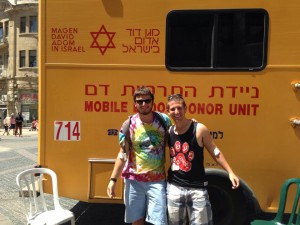EMT determines future with past in Israel
Tyler McNeil
Managing Editor

At 18 years old, Noah Shechter rescued lives, helped deliver a child and discovered his future in Israel.
“Before I went to Israel, I had no idea what I wanted to do with my life,” he said.
In high school, while most of Shechter’s friends had visited Israel, Shechter never made the pilgrimage. When Shechter’s friends told him that Israel felt like home, prior to visiting Israel, he had a hard time understanding them. After graduating high school in Paramus, N.J., he decided to study abroad in Israel through the Ashreinu program.
While in Israel, Shechter started to understand his friends’ stories about the country. Despite being 5,000 miles away from his home in New Jersey for seven months with the program, Shechter felt close to home in Israel.
During his first night in Israel in Dec. 2013, Shechter recalls feeling connected to the country after visiting Jerusalem’s Western Wall.
“I felt so connected with God at that moment and had just this sense of home with Jewish people surrounding me,” said Shechter.
Rescue
The Ashreinu program consists of three parts: learning, touring and volunteering. Shechter would take volunteer positions, such as horseback riding with autistic children to working double shifts on an ambulance.
“With the ambulance, every time you get a call, you get an adrenaline rush,” he said.
Accompanied by four volunteers, Shechter’s shifts would consist of emergency calls ranging from seizures to cardiac arrest.
One of the ambulance calls in February 2014 made Shechter speechless. He remembers helping a woman deliver a baby on her bedroom floor.
“Just one second [ago], this lifeform wasn’t there, and you helped bring [it] into the world … getting to the baby and have its eyes open in my arms on the way to hospital made me just speechless,” he said.
Along with ambulance shifts, Shechter would go on search and rescue missions sweeping fields and parking garages.
“Sometimes you’d go out and find nothing, and sometimes you would get a phone call that the person was found alive or dead or something,” said Shechter.
Tragedy
Last November, an American Ashreinu student, Ezra Schwartz, was killed while doing volunteer work as a result of a terrorist attack headed by Palestinian nationals.
“Even though I didn’t know him personally, it feels like I lost a brother,” he said.
Despite never having crossed paths with the victim, Shechter felt a connection with Swartz, studying in the same program and having stayed in the same dorm.
“It really hit home,” he said. Shechter said he knew the driver of the sherut (shared taxis) that Schwartz was shot in.
“There’s always a possibility of something happening. But believe it or not, in Israel, I felt safe at all times,” he said.
His school was equipped with bunkers in the event of an attack. Bomb sirens went off several times during his stay.
Soldiers would regularly patrol the streets in Beit Shemesh. While hiking near borders, Shechter would occasionally hear military planes flying overhead, gunshots and bomb explosions.
“You know that your life is always constantly in danger,” he said.
Future
Two days after returning to the United States from Israel in July and having been influenced by his trip, Shechter signed up for an EMT program at LaGuardia Community College.
“If I had not taken that medic program [in Israel], I don’t think I would have the incentive or the drive to take an EMT course here, and I would have never learned or gained the knowledge of ‘this is how I like helping people,’” said Shechter.
After two semesters at UAlbany, Shechter used his certification to work for First Response disaster recovery, disaster restoration and emergency response service in Englewood, N.J.
“How I became so close with those people in such a short period of time is incredible,” said Shechter.
After his father cut his college funding, Shechter decided to cut costs by coming to Hudson Valley. Over his last two semesters at the college, Shechter has looked back the past to push forward his future in the medical field.
“By doing this, it set my path for what I want to do today: training to become a nurse,” he said.
